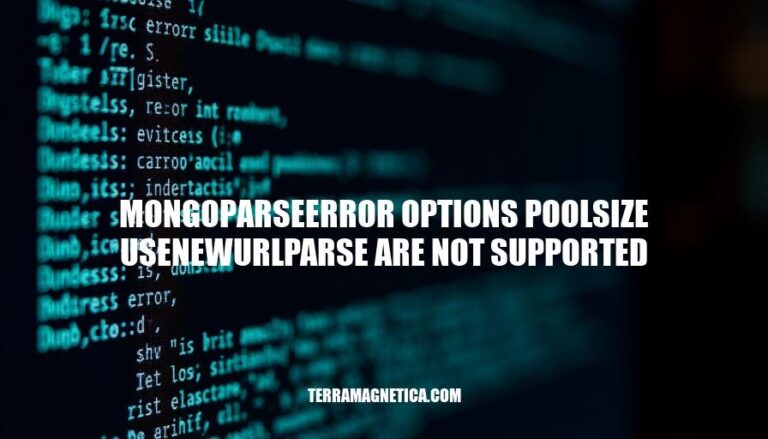


The MongoParseError: options poolSize, useNewUrlParser are not supported error occurs when connecting to MongoDB using outdated connection options. This error is relevant for MongoDB users, especially those using Mongoose, as it indicates that certain options like poolSize and useNewUrlParser are no longer supported in newer versions of the MongoDB driver. Removing these deprecated options from your connection string resolves the issue, ensuring smooth database connectivity and functionality.
MongoParseError: options poolSize, useNewUrlParser are not supported indicates that the specified options are no longer valid in the MongoDB connection string.
Removing these options from your connection string or configuration will resolve the error.
Common scenarios that lead to the MongoParseError: options poolSize, useNewUrlParser are not supported error typically involve using deprecated or unsupported options in the MongoDB connection string or configuration object. Here are a few examples:
Using deprecated options in the connection string:
const mongoose = require('mongoose');
const url = 'mongodb://localhost:27017/mydatabase?poolSize=10';
mongoose.connect(url, { useNewUrlParser: true });
// Error: MongoParseError: options poolSize, useNewUrlParser are not supported
Passing unsupported options in the configuration object:
const mongoose = require('mongoose');
const connectionOptions = {
useNewUrlParser: true,
useUnifiedTopology: true,
poolSize: 10
};
mongoose.connect('mongodb://localhost:27017/mydatabase', connectionOptions);
// Error: MongoParseError: options poolSize, useNewUrlParser are not supported
Using outdated Mongoose options:
const mongoose = require('mongoose');
const connectionOptions = {
useCreateIndex: true,
useNewUrlParser: true,
useUnifiedTopology: true,
useFindAndModify: false
};
mongoose.connect('mongodb://localhost:27017/mydatabase', connectionOptions);
// Error: MongoParseError: options useCreateIndex, useFindAndModify, useNewUrlParser are not supported
In these scenarios, the error occurs because options like poolSize, useNewUrlParser, useCreateIndex, and useFindAndModify are no longer supported in the latest versions of the MongoDB driver and Mongoose. Removing these options from the connection configuration resolves the error.
Encountering the MongoParseError: options poolSize, useNewUrlParser are not supported error can disrupt your application’s connection to MongoDB. This error typically arises when using outdated or unsupported options in your MongoDB connection string or configuration.
Potential Impact:
Importance of Prompt Resolution:
Addressing this error promptly ensures your application remains stable, efficient, and secure.
To resolve the MongoParseError: options poolSize, useNewUrlParser are not supported, you need to remove these unsupported options from your MongoDB connection code. Here are the detailed solutions and updated code examples:
The options poolSize and useNewUrlParser are no longer supported. You should remove them from your connection options. Here’s how you can update your code:
Before:
const mongoose = require('mongoose');
const connectionOptions = {
useNewUrlParser: true,
useUnifiedTopology: true,
poolSize: 10
};
mongoose.connect('mongodb://localhost:27017/mydatabase', connectionOptions);
After:
const mongoose = require('mongoose');
mongoose.connect('mongodb://localhost:27017/mydatabase', {
useUnifiedTopology: true
});
Since Mongoose v6, the default values for useNewUrlParser, useUnifiedTopology, and poolSize are already set. You can simply omit these options:
Before:
const mongoose = require('mongoose');
const connectionOptions = {
useNewUrlParser: true,
useUnifiedTopology: true,
poolSize: 10
};
mongoose.connect('mongodb://localhost:27017/mydatabase', connectionOptions);
After:
const mongoose = require('mongoose');
mongoose.connect('mongodb://localhost:27017/mydatabase');
Ensure you are using the latest version of Mongoose, as older versions might still reference deprecated options. You can update Mongoose using npm:
npm install mongoose@latest
Then, update your connection code as shown above.
By following these solutions, you can avoid the MongoParseError and ensure your MongoDB connection code is up-to-date and compliant with the latest Mongoose standards.
To avoid the MongoParseError: options poolsize, usenewurlparse are not supported error in future projects, follow these best practices:
Remove Deprecated Options:
useNewUrlParser, useUnifiedTopology, useFindAndModify, and useCreateIndex in your connection configuration. These options are no longer needed as they are the default behavior in Mongoose 6 and later.Update Connection String:
poolSize in the connection string. The MongoDB driver automatically manages the connection pool size.Use Environment Variables:
Check Documentation:
Error Handling:
Example Configuration:
const mongoose = require('mongoose');
require('dotenv').config();
const connectionString = process.env.MONGODB_URI;
mongoose.connect(connectionString, {
useNewUrlParser: true, // Optional, as it's the default
useUnifiedTopology: true // Optional, as it's the default
}).then(() => {
console.log('MongoDB connected successfully');
}).catch((error) => {
console.error('MongoDB connection error:', error);
});
By following these practices, you can avoid common configuration errors and ensure a smoother development experience.
Ensure you’re using the latest version of Mongoose by running npm install mongoose@latest.
Update your connection code to remove deprecated options like useNewUrlParser and useUnifiedTopology, as they’re no longer needed in Mongoose 6 and later.
Avoid specifying poolSize in the connection string, as the MongoDB driver automatically manages the connection pool size.
Store your MongoDB URI and other configuration settings in environment variables for security and cleanliness.
Implement robust error handling to catch and log connection errors.
Use a secure connection string by storing it in an environment variable, such as MONGODB_URI.